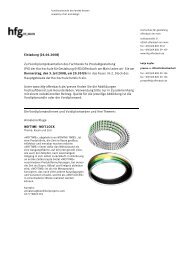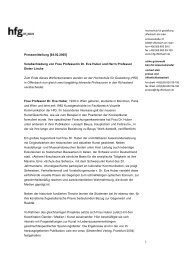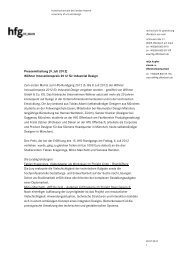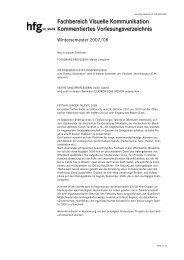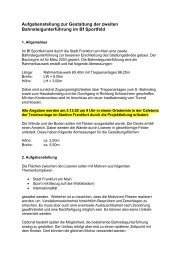User Manual
User Manual
User Manual
Create successful ePaper yourself
Turn your PDF publications into a flip-book with our unique Google optimized e-Paper software.
10<br />
11<br />
12<br />
7<br />
8<br />
9<br />
Lens focus setting too far<br />
beyond the distance of the<br />
subject framed by the central<br />
section in the viewfinder<br />
Focus setting too close for<br />
the distance of the subject<br />
framed by the central section<br />
in the viewfinder<br />
Focus setting correct<br />
28<br />
Depth-of-field calculation 7<br />
There are two distance scales (in feet and metres) visible through<br />
the focus distance window on the upper part of the lens barrel.<br />
There is also a central lens index mark and a depth-of-field scale.<br />
The focusing distance is read off the chosen scale from the central<br />
lens index.<br />
Depth-of-field can be calculated as follows:<br />
1. Focus the lens as required.<br />
2. Make an exposure reading (auto or manual) and note the<br />
aperture setting.<br />
3. Find the markings on either side of the central index that correspond<br />
to the chosen aperture.<br />
4. From these two markings, read off on the required lens distance<br />
scale the two corresponding distances.<br />
5. The depth-of-field (at that particular aperture and focus setting)<br />
will be the area included between these two distances.<br />
In the example given here, the focusing distance is set at nearly 3<br />
metres. At an aperture of f/22, the depth-of-field would therefore<br />
extend from just over 2 m to approximately 4.5 m. Note that depth<br />
of field is not an absolute. Perception of it depends on several factors<br />
and so it should be seen only as a rough guide.<br />
Stop down / depth-of-field 8<br />
A visual depth-of-field preview can be made by depressing the STOP<br />
DOWN button while viewing the image on the viewfinder screen.<br />
Infrared focus settings 9<br />
As infrared rays form an image at a different plane to that formed<br />
by visible light, the normal focus settings do not apply. Proceed as<br />
follows in manual focus mode:<br />
1. Focus the lens in the conventional manner until satisfied.<br />
2. Note the distance setting against the central lens index.<br />
3. Re-align this distance setting against the infrared mark<br />
(coloured red) instead of the central lens index.<br />
Alternatively if you have already calculated the required distance,<br />
you can make a manual distance setting by using the distance<br />
scales together with the infrared mark instead of the central lens<br />
index.<br />
Focus aid 10, 11, 12<br />
As well as the conventional view on the focusing screen to ensure<br />
a sharp image, the H3D II also features LED focus aid capability<br />
appearing as two arrowheads to the right of the viewfinder display<br />
(except for lenses with a maximum aperture of f/6.7 or smaller).<br />
The arrowheads provide confirmation of a precision focus setting<br />
and are a useful aid when making a setting with eyesight alone.<br />
<strong>Manual</strong> focus setting<br />
When the left arrowhead alone appears it means the focus setting<br />
is too far beyond the chosen distance (the area framed within the<br />
central zone in the viewfinder) and when the right arrowhead<br />
alone appears it means the focus setting is too close. Focus is correct<br />
when both arrowheads appear together. If the focus cannot<br />
be established, then both arrowheads flash.



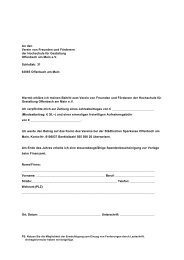



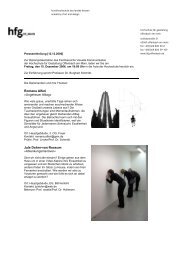
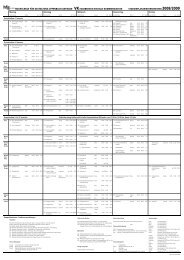
![Einladung [07.02.2006] - Hochschule für Gestaltung Offenbach am ...](https://img.yumpu.com/13375413/1/184x260/einladung-07022006-hochschule-fur-gestaltung-offenbach-am-.jpg?quality=85)

